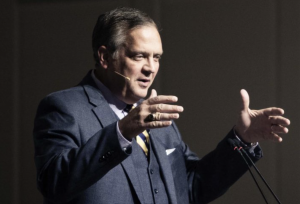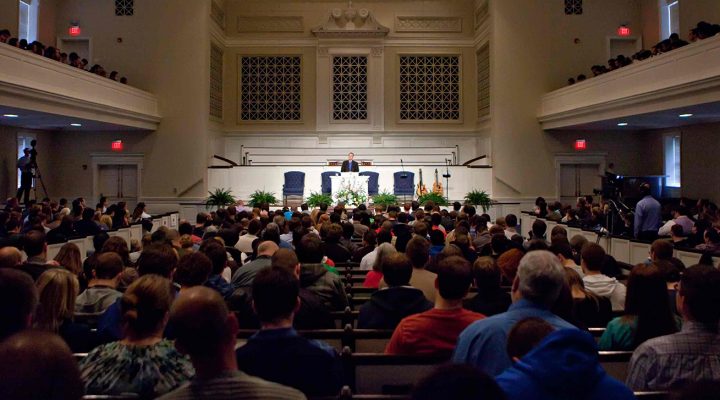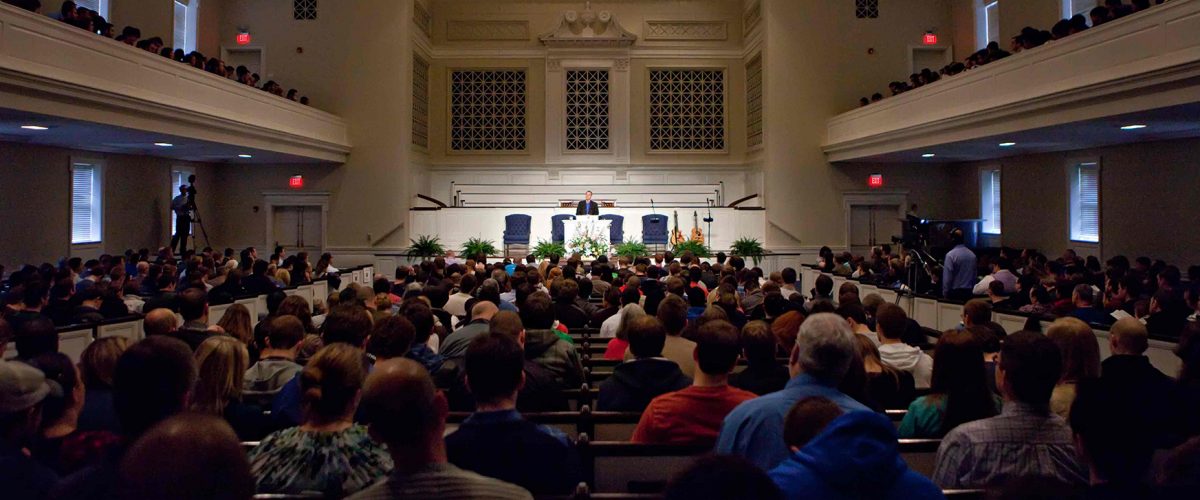In a previous essay, I reflected on the harrowing of Southern Baptist Theological Seminary that happened in the shift in administrations from President Roy Honeycutt to President Al Mohler, 30 years ago in 1993.
Readers’ comments on that column reported both the deep impact of seminary faculty on their lives during the Honeycutt years but also the searing pain of the seminary’s fracture.

Al Mohler preaching in seminary chapel (Photo: SBTS)
A major part of the pain related to the treatment of women — treatment that actually affects all of us, not just alums of Southern, a school founded by men who owned enslaved people. The previous article outlined several superlatives and sublatives of the Southern Seminary experience of the early and mid 1990s.
Very soon after the seminary’s new administration took power in 1993, Molly Marshall — Southern Seminary’s first female professor of theology — was forced from her position under unsubstantiated charges of heresy. As mentioned in my previous article, a letter to the editor of the Kentucky Baptist paper asked the incisive question: “How can Dr. Molly Marshall be guilty of teaching both universalism and apostacy?” (Indeed, these notions are mutually exclusive — even more so than calling oneself a Christian and behaving like a bully. Give me heretical belief over harmful action — six days a week and twice on Sunday.)
Next, Diana Garland — dean of the only seminary-based school of social work in the United States — was fired as dean when Mohler told media he accepted a resignation Garland said she had not tendered. This had to do with Mohler determining the basic tenets of social work were “incompatible” with Christian teaching.
While these removals happened under the cloud of political and theological accusations, the new administration eventually became explicit in its condemnation of employing theological educators who were “unqualified” to be pastors by virtue of being female.
Changing criteria
This view quickly affected students. For many years, Southern Seminary has bestowed the annual Clyde T. Francisco Preaching Award for student preaching. Monetary prizes are awarded to the top three, and at least the top two have, in years past, delivered their sermons in chapel.
During the Honeycutt years, assessment of the sermons was based on anonymous written manuscripts. Under this arrangement, at least one woman won the preaching award while I was a student in the early 1990s. That was Colleen Burroughs, raised as the daughter of Southern Baptist missionaries and later co-founder of Passport Camps and founder of Watering Malawi. I have seen her sermons hold teens and college students and general congregations in rapt attention while, more importantly, deeply influencing lives for the cause of Christ. The Southern Seminary of the early ’90s recognized her promise.
“The manner of selecting preaching award recipients changed not long after Honeycutt retired in 1993.”
However, the manner of selecting preaching award recipients changed not long after Honeycutt retired in 1993. At the current seminary website, the preaching award application states, “A calling to the pastorate is required, and leadership ability is expected.” Given the seminary’s post-Honeycutt stance on women serving as pastors, this stipulation disqualifies female applicants.
Furthermore, curious how many women have won the award, I contacted Southern Seminary and requested a list of all recipients. As of this writing, multiple staff were not aware of the location of such a list.
As a young alum in the mid 1990s, I was told by continuing students that in the mid 1990s the award process stopped being anonymous. The current application requires an audio-visual file, which eliminates complete anonymity. The 2009 application stated: “Audio presentation and manuscript must be anonymous.” Of course, an audio version makes it fairly clear if the preacher is male or female. I asked a classmate from the Honeycutt years if an audio recording was required. My classmate answered, “No recording was required. Ever. Full Stop.”
Documenting history
What prompted the change to lack of anonymity under the new administration? While seminary staff were not able to provide a list of preaching award recipients, after several messages to alums, I tracked down information about some of the recipients. I was told changes were clearly connected to what happened in April 1995, when all three preaching awards went to women. This story made the cover of the April 29 edition of the Louisville Courier-Journal.
That article reported the manuscripts of 28 nominees were judged anonymously by an all-male selection committee of six students and two faculty. After paring the field to finalists, then “judges heard audio recordings of the sermons and named the winners.” One of the awardees told me only two of the three award recipients could speak in chapel — one on Tuesday and one on Thursday. She indicated that only after the anonymous manuscripts were narrowed to three finalists were the cassette tapes used to select the two preachers for chapel.
“The selection committee would have known one of the preachers was female because she mentioned her longing, like the biblical character Hannah, to conceive a child.”
However, the selection committee would have known one of the preachers was female because she mentioned her longing, like the biblical character Hannah, to conceive a child.
These are important notes for two reasons.
First, a rumor at the time demeaned the abilities of the awardees by suggesting the selection committee chose three women in order to make a political statement. However, since the committee could not have known two of the three finalists were women, that rumor is debunked.
Second, that the committee knew one of the manuscripts was from a woman sheds light on why genuine traditionalists and an opportunistic president would feel compelled to set up hiring and admission requirements to do away with those who treated women with equality. That action already was under way.
The Courier Journal reported that the week prior to the sweep of women winning, seminary trustees had voted that all future faculty hires would be required to affirm they favored only men serving as pastors. By such steps, the award-application process soon had layers that effectively eliminated female applicants — even though the strictest application of Scripture, seen to prohibit women from being pastors, does not prohibit women from preaching.
Where are they now?
Acts 2:17, quoting the prophet Joel, proclaims, “‘In the last days it will be, God declares, that I will pour out my Spirit upon all flesh, and your sons and your daughters shall prophesy.’” However, as a result of a fear-based and inconsistent approach to biblical interpretation and application, at Southern Seminary today the following daughters of God — in addition to Colleen Burroughs mentioned earlier — would not be recognized as potential fulfillments of that prophesy:
Kimberly Baker went on to earn a Ph.D. from Notre Dame University and now serves as associate professor of patristics at Saint Meinrad Seminary and School of Theology.
Mary Beth McCloyd won the pre-ministerial award in college before going to Southern Seminary. McCloyd currently serves as pastor of Mount Zion Baptist Church in Mineral Wells, W.Va., an American Baptist church, is a dean and teaches for the West Virginia Baptist Convention School of Christian Studies and as an adjunct at Palmer Seminary.
Dixie Petrey served many years as chaplain to an assisted-living community in Knoxville, Tenn. While I was unable to reach her, a contemporary indicated that at the time she received the award she was serving as student government president. (Her son, Steven Lipscomb, produced the film Battle for the Minds, a documentary on the theo-political coup at Southern.)
When these three women won the preaching contest, the Courier-Journal reported seminary president Mohler “was not available to comment.” He was, in fact, having a rough month.
Revising history
In 2013, on the occasion of Mohler’s 20th anniversary as president, the seminary publication The Towers ran an article that was picked up by Baptist Press. It reported that in the weeks before the announcement of the 1995 preaching award winners, in a vote of no confidence, “the faculty of Southern Baptist Theological Seminary, where Mohler had been president for less than two years, overwhelmingly supported a motion that rebuked him and repudiated his policies, with only two members voting for him and two voting in absentia.”
Despite the fact Garland previously had corrected the record that she did not resign but was fired, 20 years later, the seminary PR department reported “the vote of no confidence resulted from Diana Garland’s resignation as dean of the Carver School of Church Social Work over disagreements with Mohler concerning the election of faculty who supported the ordination of women.”
“Mohler survived the vote of no confidence because he was doing exactly what the majority of Southern Baptist laypeople would want him to do.”
With the support of the trustees, Mohler survived the vote of no confidence because he was doing exactly what the majority of Southern Baptist laypeople — who were giving their money to support the school — would want him to do. (Ironically, just two months after trustees voted to require the hiring of faculty who opposed women as pastors, the SBC voted to apologize for its history in promoting racism and slavery — making one reluctant step to maturity while offsetting it with stubborn refusal to apply the same reasoning to another social issue.)
Mohler’s record of shifting his opinion to the winds of political advantage — such as repudiating candidate Trump in 2015 but endorsing him in 2019 when Mohler was vying to be SBC president — raises the fair question of whether he would have taken another position on women in ministry if it had favored his presidency.
Popular opinion?
In an earlier era, the majority of Baptists held to the ridiculous notion of Landmarkism — the thoroughly debunked idea that Baptists were not a product of the Protestant Reformation but could trace their heritage to John the Baptist without going through the Catholic church. Seminary President William Whitsitt was fired for opposing Landmarkism. The trustees hired popular pastor E.Y. Mullins without bothering to notice he had published writings agreeing with Whitsitt. Mullins used his influential position to help nurture a more tolerant Southern Baptist Convention. Whitsitt had the character to maintain his convictions. Mullins had the strength to walk a fine but honest line — even resisting populist opposition to the teaching of evolution.
Even many of today’s most conservative folks do not question women having the right to vote. Maybe one day the same will be said of women being treated as equal children of God.
There are signs that is happening. The preaching award recipients with whom I spoke described the extra hardships of pursuing careers in ministry. However, one of them sees hope.
McCloy said: “I think women starting out now have an easier time of it (at least in the American Baptist world) partly because women have become more commonplace and accepted leaders in other professions and partly because of women like myself who have prepared the way. My daughter is currently serving as a missionary and has also served as an ordained pastor. Many of the students I have in seminary classes are women who are already working in church positions. However, most churches still want a man as their lead pastor.”
Blame all around
Many on the left side of my friend network want to blame leaders like Mohler for women continuing to be repressed based on biblical arguments that helped sustain the practice of enslavement. If Mohler had not told the SBC what they wanted to hear, they would have canned him for someone who would have.
Before the left is too hasty in blaming, let’s look at some other factors. A progressive-minded professor at a Southern Baptist college once told me a prominent white male progressive pastor told him in the 1980s he would give his complete support as long as the professor never published opinions. I was told he said something to the effect, “If you put it in writing, I won’t be able to support you.”
“Women aren’t repressed by Southern Baptists just because Mohler became president of Southern Seminary.”
So, no. Women aren’t repressed by Southern Baptists just because Mohler became president of Southern Seminary. While he can be fairly criticized for being a willing participant in the oppression, fairness requires a broader view. Mohler just served what SBC pastors and parishioners ordered for Sunday lunch.
Why have progressive male pastors and scholars not been more willing to speak up? Where is the line between courage and imprudence when the question is: “What good will I be if I lose my job?”
I don’t know. I only have control over this male minister, and its past time for me to say more. I’ve said it in social media posts. I’ll say it here.
At Southern Seminary, one of my classmates and fellow student government leaders was Amy Figg Ley. The day we graduated, I told her: “Of all the folks we have been in school with, I have only thought of (few) I would want as my pastor. You are at the top of my list. I would be honored to serve on a staff where you were the lead pastor.”
Raised Baptist, she had to become a Lutheran to pursue her calling. When my son was in the hospital, she was the first person I called, and she provided superlative pastoral care.
If your view of the Bible promotes a God who begrudges that, please consider setting free those whom you aren’t paying to pick your cotton.

Brad Bull
Brad Bull was president of the December 1992 graduating class at Southern Baptist Theological Seminary. He has served as a hospital chaplain, pastor and university professor. He now works as a private practice marriage and family therapist in Tennessee and Virginia. His counseling and retreat services operate from DrBradBull.com.
Related articles:
The lion, the witch-hunt and the boardroom: Reflections 30 years after the harrowing of Southern Seminary | Opinion by Brad Bull
Thirty years later, no one has reshaped the SBC more than Albert Mohler | Analysis by Mark Wingfield
If you’re going to quote 1 Timothy 3:2, be sure to read Exodus 20:17 | Opinion by Brad Bjll


